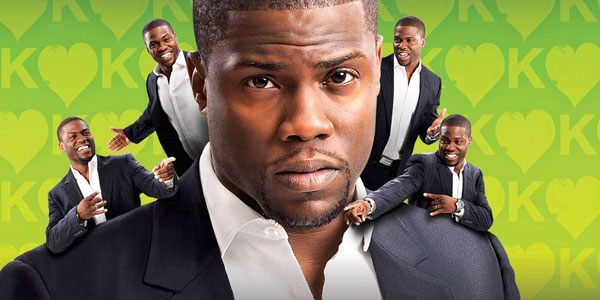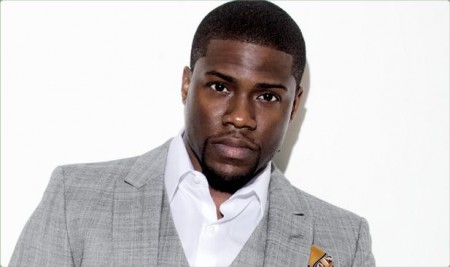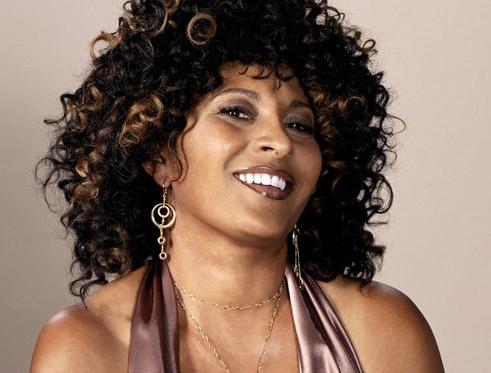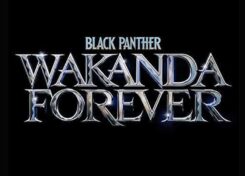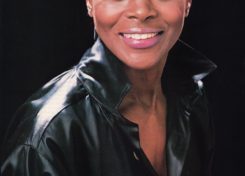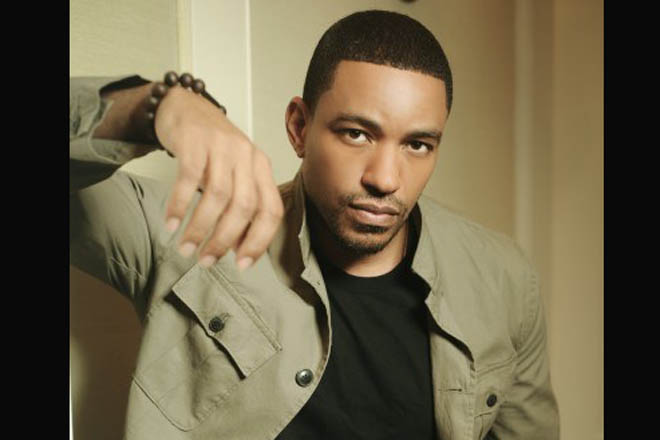Sometimes, I luck out and catch star on the rise and this time, I caught one before he came a supernova and as Martin Lawrence used to say, ‘blow-up-tuated.’ Here’s my previously-published 2010 chat with Kevin Hart and his surprising insights into life, comedy and getting the roles as well as the laughs. Enjoy….
Before he got the BET mini-series The Real Husbands of Hollywood and became the narrating comic relief in last year’s smash hit film, Think Like a Man, Kevin Hart is a comedian who’s never been scared to push the envelope for a laugh: whether he’s fighting turbulence from a toilet in an airplane bathroom (Soul Plane), struggling to take back his manhood in a dysfunctional marriage (Not Easily Broken) or serving as a sidekick or sparring partner (Superhero Movie, Scary Movie 3), this Philadelphia native and former shoe salesman just wants to help you get your laugh on, even if the joke happens to be at his expense.
With a writing and production credits under his belt (ABC’s 2004 sitcom, The Big House), steady stream of film roles, nationwide comedy tours and another film awaiting release in the fall, it’s fair to say that Mr. Hart’s been a pretty successful at it.
Recently, when Death At A Funeral, opened, the 30-year-old father of two relates with DSN about his goals, what drives his comedic edge and why, even after all of the biting criticism aimed its way, he’s thankful for the movie Soul Plane.em>
LORRIE IRBY JACKSON- You’ve got a crazy schedule these days, so thanks for squeezing us in Kevin.
KEVIN HART- Of course, no problem.
LIJ- You’ve been able to grow and build on your resume over the years, does it amaze you at times how much progress you’ve made?
KH- Not really, because when you dwell on the level of success you have in your career, you can get content, and I can’t do that because there’s so much more that I want to do. I will say that after I did Fools’ Good (the 2008 film starring Kate Hudson, Matthew McConaughey and Donald Sutherland), it kind of hit me what kind of company I was keeping and the level of stars I was around had started getting bigger and bigger.
LIJ- How did you get involved with this year’s adaptation of a 2007 British film, Death at a Funeral?
KH- Chris rock called me at the last minute and offered me the part, he said that it would be fun for me and that it was a great part, a really strong cameo. The fact that Chris even called me was huge, you know? So I said ‘yeah, of course’ , because it wasn’t just Chris, there was Danny Glover, Loretta Devine, Regina Hall, Columbus Short and other big names involved. It’s a nice part, I’m in the first 4 scenes, I’m responsible for a lot of things in the movie and it should do great.
LIJ- Exciting! Any other film you’re working on right now?
KH- Sure, right after that, we have The Little Fockers coming out, a sequel to Meet the Fockers. It comes out in September or October, if I’m not mistaken.
LIJ-The first film featuring you as a leading character, Soul Plane, got a lot of scathing reviews for its over-the-top vulgarity and the stereotypes throughout. Looking back, how do you feel about being associated with that film today?
KH- I’m so thankful for that movie, it gave me the opportunity to showcase my talent as a leading man. Regardless of whether it received feedback that was negative or positive, the reviews for my character and performance were nothing but positive. Since then, that film’s been my reason for work and it’s gotten me other acting jobs, so I’m a big fan of Soul Plane and what it stands for.
LIJ- You’ve worked with some incredible talent over the years Kevin, is there anyone else in particular you want to be on a set with?
KH- I’ve worked with so many great people: Charlie Sheen, Leslie Nielsen, Ben Stiller, Robert DeNiro, Martin Lawrence, Eddie Murphy, Bernie Mac, so….hmmm. I haven’t worked on camera with Cedric the Entertainer yet. Cedric is a friend of mine, so I’d like to do that soon. There’s Will Smith, Denzel Washington, Matt Damon…. The list is pretty extensive. I’d like to be able to work alongside the greats and still be myself. It’s one thing that I pride myself on, the fact I don’t change at all. What you see is what you get. I think that’s why people continue to gravitate toward me and like having me around, because if you ask people in the Hollywood circles about me, they all tell you the same thing: he’s professional, he’s funny, he’s cool, and that’s the rapport that I want to continue to have.
LIJ- That’s definitely a good look. Now, back to stand-up: when you’re up there cracking the jokes, where are you pulling your humor from?
KH-Pain. I mean, once you get through the worst of it and analyze what happened, a lot of it is funny. That’s how I develop my comedy, I look at the things that I have problems with or that bother me, and I talk about em’ on stage. If I have a bad day with my kids (a five-year old daughter and 2-year-old son), I figure out why and then I talk about it. And then, there’s relationships. Relationships can be tough. You can get mad, but once you step back and look at what happened, it’s funny. So what I do is I take real-life situations, paint the pictures to an audience in a way that they can relate to.
LIJ- There was a bit of a Twitter controversy when you joked about dark-skinned black women. Have you changed your approach to humor after that, or do you still do whatever hits your funny bone, so to speak?
KH-I’m not the guy to tease or make fun of people but at the same time, I have a voice, and what I’m gonna talk about is what I’m gonna talk about, I don’t let other people’s judgment dictate my words and my opinions. If I feel something’s funny, I’m going to talk about it. It may get negative feedback or positive feedback, but I’m not going to shy away from it. If you like it, I’ll own it, and if you don’t like it, I’ll still say I said it. I’m my own boss and I’m working for me.
LIJ-What does the audience most relate to?
KH- Kids—-They love the fact that I talk about my kids. Actually, I pattern myself after Bill Cosby, because he talked about himself, he talked about his life and kept it so personal that you had no choice but to love that man, I just do it on an edgier scale. I talk about everything I go through and open myself to so much that I leave myself open to vulnerability, and they feel that too.
LIJ- There’s also another part tough of the job, balancing career and family. Is that a particular problem for you?
KH-That’s the toughest part of my career, the fact that I travel so much. There are times that I’m home for long stretches of time, and there are other times, like now, where I’m filming movies and doing comedy. Not seeing them everyday can definitely take a toll, but you gotta keep that in the back of your head and realize the ultimate goal, that when you benefit, your kids benefit. And as long as you keep that drive in your mental, you’ll be fine. They’re young, but they’re used to it, and being a dad is the best thing in the world.
LIJ-Seeing that Chris Rock’s got you in his calling circle, do you have to hustle hard for that many roles now, or is it easier to get them just by default?
KH-It’s half and half. Some of the roles come easy, some of them come hard. And that’s good, those are the parts of the business that keep you level-headed. If everybody is just kissing your @$$, it’s easy to get caught up in that. So I’m glad that I still have to audition.
LIJ- Do you feel as though there are more roles for African-Americans actors and filmmakers today, or do you feel that the mainstream is opening up to more diverse talents?
KH- It’s a bit of both. I think you have some black entrepreneurs that have made some big moves and are now in a position to help others, and at the same time, the African-Americans talent has become so good to where they’re crossing over and attracting the mainstream in a major way. Look at Zoe Saldana, Idris Elba, Columbus Short…it just takes time, so I feel as if I’m patient, it will pay off. There’s nothing wrong with doing African-Americans films: the money or budget may not be the same, but the quality of work could be above and beyond. Look at Mo’Nique’s film, Precious: the budget wasn’t a big one but look at the quality of the work. It’s talented people who get with other talented people and say ‘hey, you may not get millions of dollars, but if you make it and we win (accolades, awards, etc), we make it back in the end.’ And that’s how they’re doing it now.
LIJ-Speaking of black films, I enjoyed your role as the henpecked husband in Not Easily Broken. What ws it like to work with Bishop TD Jakes?
KH- Thank you. He’s a good dude, a very positive guy who loves his wife, loves his family, loves Jesus and is not afraid to tell you that, but he never tries to push his point of view on you. He’s a really great guy, and I was thankful for the opportunity.
LIJ- None of your lines seemed scripted—did you improvise a lot in that role?
KH- (laughs) It was me improvising and them allowing me to be me. They allowed me to play with it and go with the flow.
LIJ- I hope that Death at a Funeral does well for you Kevin, looking forward to seeing you in it. Any advice you have for other struggling artists trying to make their mark in the game?
KH- All I can say is work hard, do you and be you. Remain your authentic, honest self, that’s the way you’re going to win. Whenever people see me, I’m just regular old Kevin Hart, and what you see is what you get, no matter what.

